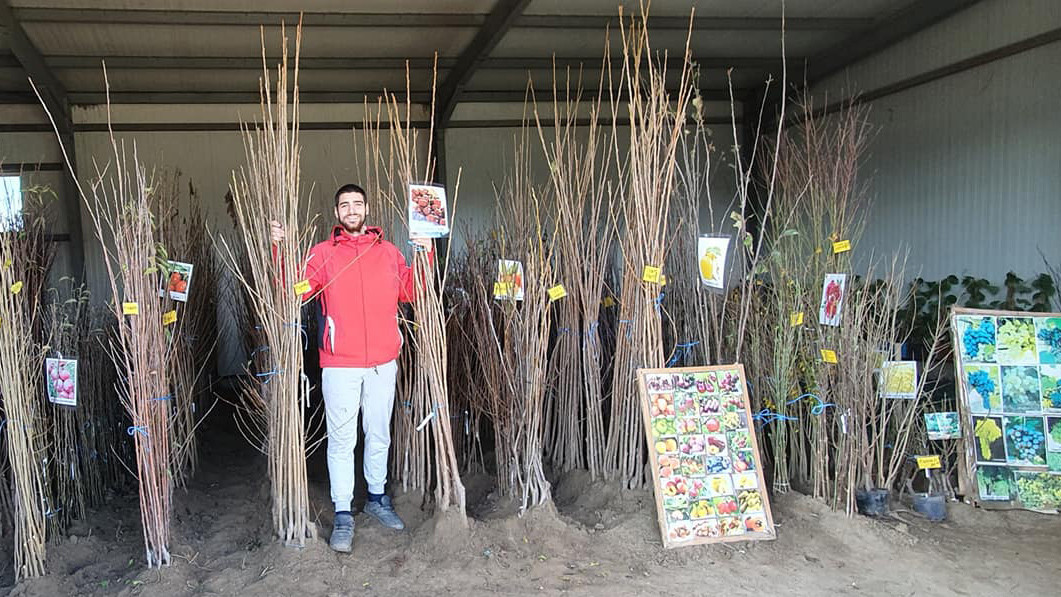Milen Georgiev owns a fruit nursery near the town of Aitos( Southeast Bulgaria). He has been working in this family business for more than 20 years and the quality of his produce is always high. Milen plants various sorts of fruits – several sorts of apples, pears, peaches, cherries, sour cherries, plums, walnuts, hazelnuts, as well as different vine varieties. Lately, there is a great demand for kiwi and pistachios.

The fruit nursery covers 10 hectares of land. Milen’s family owns greenhouses as well. The Covid-19 pandemic made 2020 difficult and unusual for all types of businesses, but farmers are facing even greater challenges due to the vagaries of the weather:

“We were definitely affected by the coronavirus pandemic – Milen Georgiev said for Radio Bulgaria. We were closed during the strongest months because of the pandemic. However, all other businesses had the same problem. On the other hand, 2020 has been a year of severe drought. Fortunately, we have our own water sources and managed somehow.”

It is too early to sell now. The weather is quite hot. The plants are in strong vegetation and are growing quickly. Fruit trees should be kept in the soil until they shed their leaves. Then they are ready to be planted in the orchard, the experts says further. In his view, licensed nurseries are the most reliable sources of high-quality saplings, because some people make money at the expense of the quality and the variety of seedlings.
The EU agriculture programmes have direct impact on the establishment of orchards in our country.
“We have many clients who apply for financing under some EU programmes, in order to make big orchards – Milen Georgiev explains. – We also help them- we mark and plant their orchards, issue certificates necessary to prove the quality of seedlings to the European Commission which evaluates them, in order to provide them with financing and points. Recently, many farmers make gardens in advance, in order to participate under these EU programmes. That is why, they expect help from us. ”

Milen Georgiev proudly says that they have clients from all parts of Bulgaria. Some buy saplings to plant huge gardens and some buy 10 to 15 trees only. He and his family travel across Bulgaria and plant their saplings everywhere.
The type of fruit trees planted highly depends on the type of EU subsidies allotted in this sector. For instance, the EU allotted funding for walnuts, prunes, all kinds of pome and stone fruits. Every time EU subsidies are allotted to the sector, the farmers benefit from them.
If you want to plant fruit trees in your own garden you should remember that the best time to do it is by the end of March when climate conditions are most favorable.
English version: Kostadin Atanasov
Photos: Facebook/ Milen Georgiev
Urgent reform of Bulgaria's planning districts is needed, local authorities insist.The current regionalization shows increasing economic imbalances in terms of EU grant assistance. The problem is particularly severe in the Southwestern region, which..
The final price at which Bulgargaz will sell natural gas in December to end suppliers and to persons with a license for the production and transmission of thermal energy is 75.89 BGN/MWh (excluding excise duty and VAT), the company announced...
Butter and vegetable oil are the products that have increased in price the most over the year. The retail price of vegetable oil will range between 3 and 5 BGN (EUR 1.5-2.5) per liter until the new harvest. The value of the small consumer basket,..
Bulgaria is making the necessary progress towards adopting the euro, according to representatives of the European institutions whom Finance Minister..
Financial and tax stability has been shaken in recent years so it is good that a government has been formed, said Vasil Velev, chairman of the Bulgarian..

+359 2 9336 661
